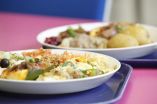(Press-News.org) Severely overweight people who suffer from hypoventilation can have abnormally low levels of oxygen (hypoxaemia) in their blood during air travel as a result of reduced atmospheric pressure in the cabin of aircrafts.
In a recent Respirology study, even patients diagnosed with obesity hypoventilation syndrome who were in the care of specialist and had normal daytime blood oxygen levels were still at risk of hypoxaemia when flying.
"The findings suggest that it is advisable for all hypoventilation syndrome patients to do a hypoxic challenge test before air travel to be better prepared for the possibility that supplementary oxygen on-board or non-invasive ventilation is needed," said lead author Dr. Masood Ali.
INFORMATION:
Patients with hypoventilation may need supplemental oxygen on-board flights
2014-08-04
ELSE PRESS RELEASES FROM THIS DATE:
Baby universe picture brought closer to theory
2014-08-04
Last year, the Planck Telescope revealed the most detailed picture of the cosmic microwave background, the relic radiation from the Big Bang. But this map contains features that challenge the standard model of cosmology, the theory that describes our entire Universe from early on. Who is right, the map or the theory? Scientists from EPFL (Switzerland) and CEA (France) have shown that several of these enigmatic features disappear from the map by processing Planck telescope's data differently and including other effects, such as the motion of the Milky Way. The findings are ...
New material allows for ultra-thin solar cells
2014-08-04
This news release is available in German.
Extremely thin, semi-transparent, flexible solar cells could soon become reality. At the Vienna University of Technology, Thomas Mueller, Marco Furchi and Andreas Pospischil have managed to create a semiconductor structure consisting of two ultra-thin layers, which appears to be excellently suited for photovoltaic energy conversion
Several months ago, the team had already produced an ultra-thin layer of the photoactive crystal tungsten diselenide. Now, this semiconductor has successfully been combined with another layer ...
New recommendations for post-treatment care of prostate cancer survivors
2014-08-04
New Rochelle, NY, August 4, 2014 -- Many of the more than 2.5 million men in the U.S. who have received treatment for prostate cancer deal with the often disabling side effects of surgery and radiation and hormonal therapies. To aid in the transition of these patients from specialty to primary care for long-term management of problems such as urinary incontinence and sexual and bowel dysfunction, updated guidelines for prostate cancer survivorship care are published in Journal of Men's Health, a peer-reviewed publication from Mary Ann Liebert, Inc., publishers. The article ...
Patient navigation may aid in breast cancer treatment in high-risk populations
2014-08-04
(Boston) -- Patient navigation, or the linking of a newly diagnosed cancer patient with a professional trained in assisting patients though the complex journey of cancer diagnosis and treatment, may lead to better breast cancer care in high risk and minority women. The findings, recently published in the Journal of Clinical Oncology, is the first national study to show a relationship between navigators and the initiation of certain recommended treatments in breast cancer.
Using data from a previously published, multi-center study funded by the National Cancer Institute, ...
Tricking plants to see the light may control the most important twitch on Earth
2014-08-04
MADISON, Wis. — Copious corn growing in tiny backyard plots? Roses blooming in December? Thanks to technology that the University of Wisconsin-Madison's Richard Vierstra has been developing for years, these things may soon be possible. And now, new findings out of the genetics professor's lab promise to advance that technology even further.
For the first time, Vierstra and his team have revealed the structure of the plant phytochrome, a critical molecule that detects the light that tells plants when to germinate, grow, make food, flower and even age. Like eyes, the phytochrome ...
Daylight is the best medicine, for nurses
2014-08-04
For the health and happiness of nurses – and for the best care of hospital patients – new Cornell research suggests exposure to natural light may be the best medicine.
In a forthcoming Cornell study published in the journal Health Environments Research and Design, Rana Zadeh, assistant professor of design and environmental analysis, discovered nurses who had access to natural light enjoyed significantly lower blood pressure, communicated more often with their colleagues, laughed more and served their patients in better moods than nurses who settled for large doses of ...
Diet change -- A solution to reduce water use?
2014-08-04
Eating less meat would protect water resources in dry areas around the world, researchers at Aalto University in Finland have found.
Reducing the use of animal products can have a considerable impact on areas suffering scarce water resources, as meat production requires more water than other agricultural products.
Diet change together with other actions, such as reduction of food losses and waste, may tackle the future challenges of food security, states researcher Mika Jalava from Aalto University in Finland.
Growing population and climate change are likely to ...
Cell plasticity may provide clues to origin of aggressive type of breast cancer
2014-08-04
INDIANAPOLIS -- Healthy breast cells may be able to reinvent themselves -- some have the flexibility to change after they are mature -- which leads researchers to postulate that similarities exist between this occurrence and the origins of a particularly aggressive type of breast cancer.
A team of researchers, led by Candice A.M. Sauder, M.D., while a resident at the Indiana University Department of Surgery, reported online in BMC Cell Biology that healthy breast cells separated from their normal environment were able to transform into types of cells similar to those ...
Students cope well with healthier snacks
2014-08-04
Students do not mind buying healthier snacks from vending machines, according to research published in the International Journal of Food Safety, Nutrition and Public Health. The findings could have implications for campus health initiatives as well as vendor profits.
The common stereotype of the busy student is of someone who will grab a junk food snack between lectures and rarely chooses a decent, hot meal over a chance to share a beer or two with fellow students. If the stereotype is an obvious generalization, one point remains true, snacks from vending machines on ...
Diabetes: A duo helps better
2014-08-04
Various active substances in oral antidiabetic agents are frequently combined in the treatment of diabetes in order to achieve an effective reduction in the blood sugar. A new, very promising approach combines the substances metformin and SGLT2 inhibitors, the latter were just approved in 2012. Scientists headed by Dr. Susanne Neschen and Prof. Dr. Martin Hrabě de Angelis from the Helmholtz Zentrum München, in cooperation with Ludwig-Maximilians-Universität München and drug manufacturer Sanofi Aventis, have discovered how the two substances reinforce each other.
Medicinal ...


